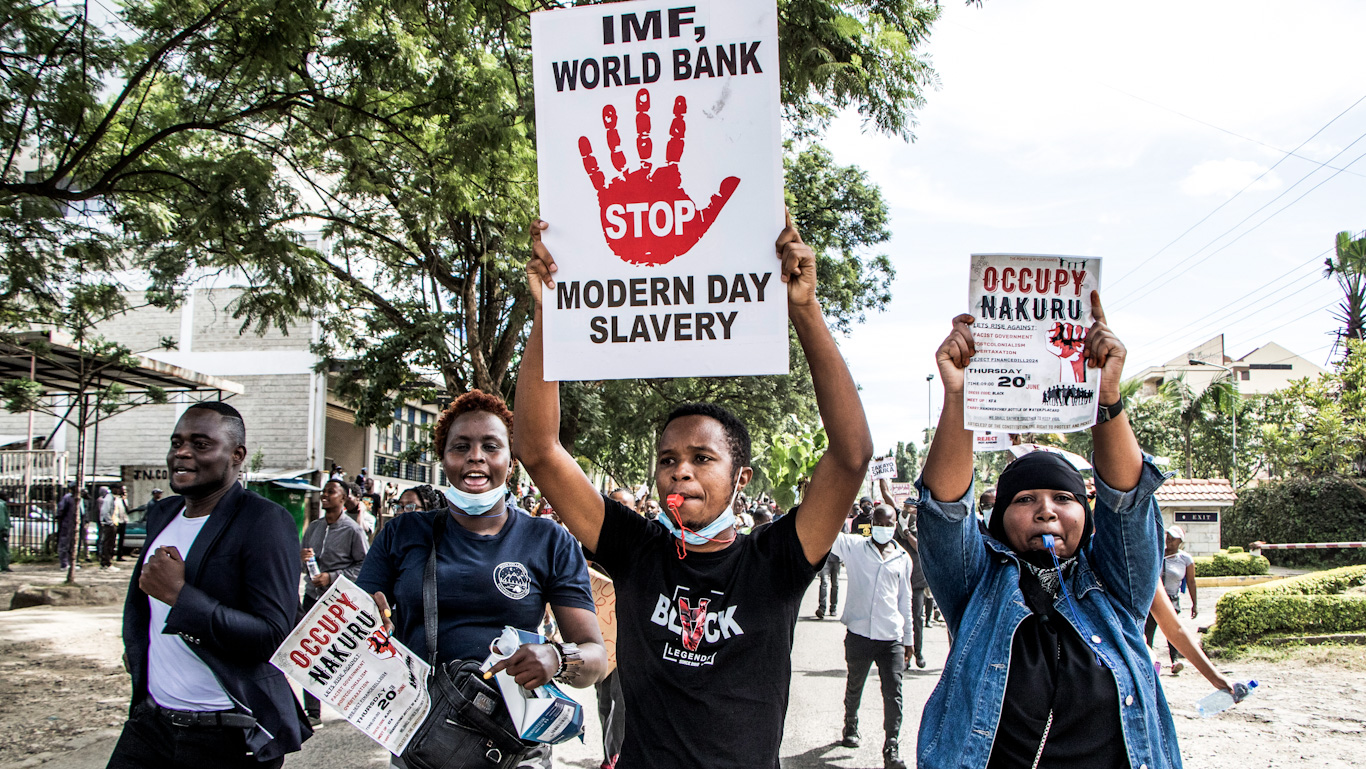At least 23 Kenyan protesters were killed on Tuesday after hundreds stormed the nation’s parliament in response to a proposed tax-hike bill, which threatens to deepen the country’s cost of living crisis. The IMF’s pressure on Nairobi to balance its budget is central to the issue.
Videos of bodies strewn across the concrete and protesters storming the parliament went viral on social media. This follows protests the previous week that brought the nation to a standstill. President William Ruto, elected to address the cost of living crisis, is now seen attempting to combat dissent with force, having failed to improve conditions.
Kenyan people burned the parliament house during protest of IMF Budget. #RejectFinanceBill2024 #Kenya#قومی_مطالبہ_خان_کی_رہائی#SupremeCourt #Pakistan #QaziFaezIsa #ImranKhan #SeatsBelongToPTIpic.twitter.com/KA20PCmY9h
— Saim Baloch (@spotimon) June 25, 2024
The Kenyan Human Rights Commission reported that the Police Reforms Working Group (PRWG) recorded 23 deaths from police shootings, along with at least 50 arrests, 22 abductions, and over 300 injuries among protesters.
The controversial bill in Kenya seeks to impose new levies on monetized digital content creation, a 5% tax increase on digital payments, a 16% VAT on bread, and a 25% excise duty on domestically produced vegetable cooking oil. Despite President Ruto publicly backing down from signing the bill, tensions remain high.
Western media focus on the protests and police response, but little attention is given to the IMF’s role in pressuring President Ruto to implement these tax policies to repay loan debt. Since his election in 2022, Ruto has pushed through numerous tax-hike bills, pleasing the IMF and international investors but angering his people.
Protesters have prominently displayed signs opposing the IMF, urging the government not to let the country become a “lab rat.” The bill aims to raise an additional $2.3 billion in taxes to reduce the national debt, which is 68% of GDP, far above the recommended 55% by the World Bank and IMF. About 37% of Kenya’s annual payments go towards interest loans that are nearly impossible to repay.
In 2021, Kenyans protested and petitioned the IMF to cancel a three-year financing package worth $2.34 billion, citing concerns over the authorities’ mismanagement. The loans were intended to help Kenya’s COVID-19 response and reduce debt vulnerabilities. However, the nation has sunk further into an unbearable cost-of-living crisis.
While the U.S. State Department has publicly condemned the violence against protesters, it has grown closer to the Kenyan government over the past few years. One day before the shooting of protesters, the U.S. government issued a ‘Memorandum on the Designation of Kenya as a Major Non-NATO Ally.’ This move aims to pull Kenya into the U.S. sphere of influence to counter China’s and Russia’s growing presence in Africa, using weapons deals, foreign aid, and loans.
Kenyan Police arrived in Haiti for a US-funded intervention on the same day that they killed at least 13 protesters in during protests in Kenya. President Ruto applies the IMF’s neoliberal recipes at home while serving US interests abroad. pic.twitter.com/K6pY4Pr7ps
— red. (@redstreamnet) June 26, 2024
Kenya is now leading a U.S.-backed multinational policing mission in Haiti to combat local gangs at the Haitian government’s request. Some gangs, however, have gained local support for maintaining order, causing the mission to be seen as foreign intervention, potentially sparking further violence.
Kenya’s economic struggles date back to the 1944 Bretton Woods conference, which led to the creation of institutions like the World Bank and IMF. In the 1980s, African nations began seeking loans from these institutions, which often proved impossible to repay. This placed many nations, including Kenya, at the mercy of the IMF, allowing it to push its political, economic, and social agendas.
The Global Financial Summit of 2023 continues this trend, aiming to impose new economic realities on Africa and the Global South.
Feature photo | Protestors chant slogans against the IMF while carrying placards during a demonstration in Nakuru Central Business. James Wakibia | AP
Robert Inlakesh is a political analyst, journalist and documentary filmmaker based in London, UK. He has reported from and lived in the occupied Palestinian territories and hosts the show ‘Palestine Files’. Director of ‘Steal of the Century: Trump’s Palestine-Israel Catastrophe.’ Follow him on Twitter @falasteen47


